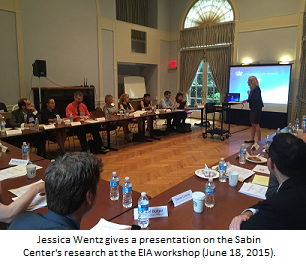The Paris Agreement, which will enter into force on November 4, aims to keep the increase in global average temperatures to well below 2oC above pre-industrial levels. Achieving this goal will require the development of a wide array of new clean energy and other technologies. The deployment of these technologies and their transfer between countries, particularly from rich to poor, will be greatly affected by intellectual property law. These effects are explored in the recently published Research Handbook on Intellectual Property and Climate Change, edited by Joshua Sarnoff, a professor at DePaul University College of Law.
In his introduction to the handbook, Sarnoff observes that “technology, and its effective and efficient development and transfer, is a central focus of the book.” Underlying many of the chapters is a concern that technologies needed to address climate change may be subject to intellectual property rights which restrict their transfer and use. The initial chapters (2 to 7) provide a useful introduction to the problem of climate change and the technological shifts required to mitigate it, before exploring the intellectual property law regime in which these shifts will take place. This regime is further elaborated in later chapters (16 to 22), dealing specifically with patents, copyrights, trade secrets, and other areas of intellectual property law, relevant to the deployment of climate change mitigation technologies.
While intellectual property concerns lie at the heart of the book, it also considers other legal and policy issues likely to affect the impending technological shift. Chapters 11 to 15 explore various government and market-based approaches to promoting the development of new mitigation technologies. Approaches considered include government financing, procurement, and direct supply. Consideration is also given to the government’s role in correcting market failures that could impede technological development, with chapters focusing on antitrust law and international trade law.
As a whole, then, the book offers a useful introduction to the various issues affecting development and transfer of climate change mitigation technologies. It is particularly timely given the entry into force of the Paris Agreement, providing an interesting and accessible account of how intellectual property and other legal regimes may affect the technological shifts needed to achieve the Agreement’s 2oC goal. This is essential knowledge for all climate law scholars. As Sabin Center Faculty Director Michael Gerrard notes in his own review, the deployment of climate change mitigation technologies “will involve not only the environmental, energy and treaty laws familiar to climate law specialists, but also a bewildering array of issues under intellectual property, trade, procurement, and other legal fields. Joshua Sarnoff has done a wonderful job in assembling leading experts from around the world to illuminate these complex matters.”
The Research Handbook on Intellectual Property and Climate Change was published by Edward Elgar Publishing.



